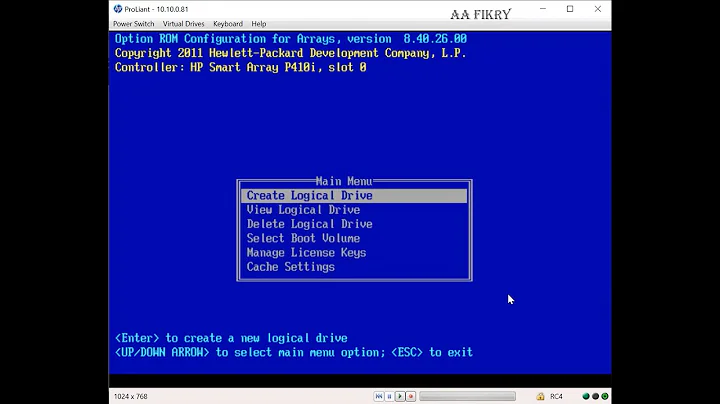Hadoop JBOD disk configuration on HP Smart Array 410/i disk controller
Solution 1
The Smart Array 410/i controller only allows 2 raid devices to be created without the optional memory card added to it. So if your hardware only has 2 drives, then it would be fine; you can just make it 2 raid0's. If you have more then 2 drives you will probably have to purchase Part #462974-001 - 256MB Battery Backed Write Cache BBWC memory module. If you aren't sure, give it a try in the configuration utility, it will complain that there is a limit on the number of configured raid devices allowed if you need to purchase the memory addon.
I recently setup a ZFS server utilizing one of those and 12 disks in RAID0 mode for each and it performs fine. Since you can disable pretty much all features of the actual raid controller, its effectively the same as JBOD mode.
Solution 2
This situation is similar to what I encounter when designing hardware for ZFS storage solutions. ZFS is a software RAID and leverages the server's resources for disk management. Hardware RAID isn't recommended, and JBOD isn't really possible with Smart Array controllers. So when using ProLiant systems for ZFS, I replace the Smart Array controller with something that has a JBOD mode or a basic SAS/SATA HBA.
Typically, this will be an LSI SAS HBA (without RAID features). My preference is the LSI 9211-8i or 9205e.
See the recommendations at: ZFS SAS/SATA controller recommendations
Related videos on Youtube
nysalsa
Updated on September 18, 2022Comments
-
nysalsa over 1 year
I'm in a evaluation phase of some hw that could be used for setting up a hadoop cluster. This hw is refurbished (hp G6 servers w/ Smart Array 410/i controller) and probably we should/must use it... we haven't it yet. I've read that 410/i controller doesn't allow a JBOD configuration as required by hadoop, is there anybody that could confirm this statement ? Or not ? Seems that a workaround could be to configure raid0 on every single disk, again anybody confirms it or there is other ways of configuration ? Thank you Rob
-
 ewwhite about 13 yearsWhile you can create multiple RAID 0 on that controller to be used with ZFS, you will have a problem if a disk fails. ZFS won't recognize the replacement unless you reboot.
ewwhite about 13 yearsWhile you can create multiple RAID 0 on that controller to be used with ZFS, you will have a problem if a disk fails. ZFS won't recognize the replacement unless you reboot. -
nysalsa about 13 yearsThanks for the answer, HDFS (Hadoop file system) has built-in redundancy by replicating blocks across multiple nodes. RAID 0 is slower than the JBOD configuration used by HDFS because I/O is limited by the speed of the slowest disk in the RAID array I/O on JBOD is independent, so the average speed is greater than that of the slowest disk. Test done by Yahoo showed JBOD performing better than RAID 0: markmail.org/message/xmzc45zi25htr7ry
-
 ewwhite almost 10 yearsDo NOT do this. You lose hot-swap capabilities and will have logical drive block device enumeration issues. A failed disk == failed logical drive == new device created upon replacement.
ewwhite almost 10 yearsDo NOT do this. You lose hot-swap capabilities and will have logical drive block device enumeration issues. A failed disk == failed logical drive == new device created upon replacement. -
sl0n almost 10 yearsThe "how-swap capabilities" ? You mean I won't be able to replace a failed disk in "online" mode, ie I would need to power off my server prior to replacing the failed disk? In regard to the device enumaration, I'm going to check that, I think it's a fair point.




